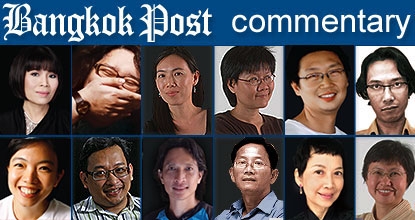
The May 22 coup returned a semblance of normalcy to the country. What happened last week has shown how fragile that is.
For the past six months, the draconian martial law has succeeded in silencing most coup critics. Early anti-coup activism was effectively nipped in the bud through compulsory summoning for questioning, temporary detention and threats of arrest.
Critics may vent their frustration and sarcasm in private or in social media. But protests are out, given the military ban on gatherings of more than five people.
That climate of fear was broken last week when humble groups of villagers rose up in demonstration. Interestingly, the ones who have dared to challenge the ruling power are also society's most powerless.
In Chiang Mai, a group of forest dwellers and their advocates were arrested just before they were about to start a protest march against violent forest evictions. Although these land reform activists were quickly released after their arrest, the message was clear: The military is ready to wield its big stick against anyone who won't submit to its authority.
In Songkhla, grassroots groups spoke their minds frankly about what they want from the military's reform efforts in a TV programme on Thai PBS. It was aired — criticism, protest posters and all — prompting a "visit" by a group of colonels to the TV station where they demanded the removal of the programme's host, Nattaya Wawweerakoupt.
Thai PBS management in Bangkok heeded the "request". Gen Prayut Chan-o-cha, the junta leader himself, later came out to support his subordinates, insisting the media must "respect the rules". Nattaya is a veteran TV journalist who is a strong advocate of grassroots democracy. Her TV programmes have given voices to the powerless by letting them air grievances and propose bottom-up solutions.
The military's silencing of Nattaya is also seen by grassroots groups as an effort to silence their demands for power decentralisation. The land rights network and others have been active through successive centralised governments to stop imposing top-down projects that destroy their environment, sources of livelihoods and way of life.
Given the military's sustainable development talks — and promise to be open to local input on the reform agenda — they are deeply disappointed with the Prayut government's policies to press ahead with the environmentally destructive development projects of previous governments.
They include big dams in forests, a deep-sea port in the Andaman sea, construction of coal-powered plants, mining in forests, and a plan to grant new oil drilling concessions despite fierce local resistance — to name just a few. For them, it is not more of the same. It is worse because they no longer have the freedom to negotiate with the authorities, to protest or even to say what they think.
While city critics have no choice but to bury themselves in bitterness under the threat of martial law, villagers whose livelihoods are closely dependent on a healthy natural environment have no choice but to take a risk for their own survival.
The seeming political calm is starting to show fissures. But will they grow to become a threat to the junta soon? I doubt that.
For starters, the urban middle class and city elites — the main supporters of the military junta — simply do not care about grassroots grievances. They may join protests against dams in forests to protect wildlife and biodiversity. But don't depend on their support for the poor's land rights and land reform network. For them, people and forests cannot co-exist.
We also cannot deny that the May 22 coup has restored a sense of normalcy to Bangkok. No more road blocks. No more street protests and emotional ups and downs of the never-ending "last battles". No more fear of bomb blasts in public places. No more deep anxiety about street bloodshed. If they have to return to the old mayhem, they will choose the junta anytime.
Living in the island of urban wealth, they cannot relate to the suffering of the poor. Being trapped in ethno-centric nationalism, they cannot empathise with forest people or the Malay Muslims who wither under systematic persecution. Due to colour-coded politics, many academics and opinion leaders who used to hail people's empowerment and media freedom have also given them the cold shoulder.
Despite the perpetual order to be happy, I must violate that order and feel sad. Very sad.
Sanitsuda Ekachai is editorial pages editor, Bangkok Post.
